 |
| "You forgot you said you loved me. Swore you'd never cause me pain. While you're forgetting, baby...remember my name." |
Remember My Name is a moody, disconcerting, not-to-everyone’s-taste update of the classic 1940s women’s melodrama. Not to everyone's taste, this Altman-esque neo-noir (written and directed by Robert Altman protégé Alan Rudolph) takes its time. And it resists the standard genre structure in its exploration of the femme fatale mystique through a distinctly ‘70s, decidedly feminist prism.
 |
| Geraldine Chaplin as Emily |
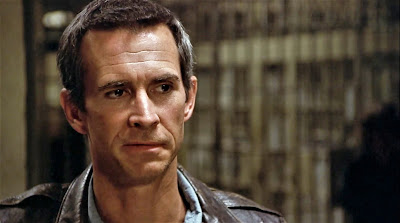 |
| Anthony Perkins as Neil Curry |
 |
| Berry Berenson as Barbara Curry |
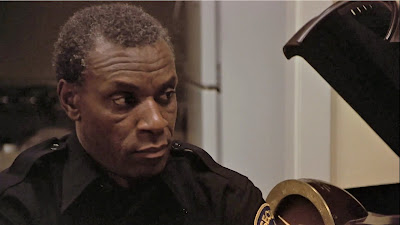 |
| Moses Gunn as Pike |
 |
| Alfre Woodard as Rita |
 |
| Jeff Goldblum as Mr. Nudd |
When I
was growing up, movie theaters screened films in “continuous performance.” This
simply meant that movies (usually double or triple features) were screened continuously
throughout the day, often without benefit of intermissions, and patrons were
free to come and go as they wished.
What this
meant for me and my three sisters—the eldest harboring a near-manic aversion to
coming in on a movie already in progress—was that every trip to the movies involved
an elaborate lobby ritual built around ensuring our not hearing or catching a glimpse of the ending of feature #1, yet making sure we were in our seats in
enough time for the start of feature #2.
When arriving
at a theater before movie #1 had ended, my elder sister would insist we stand
in the lobby—balancing our popcorn, drinks, and candy—assigning a reluctant
electee (me) the task of periodically peeking through the slats of the
auditorium double doors, to be on the lookout for scrolling end credits: this
being the sign to give my sisters the “thumbs up,” indicating that the coast
was clear and that it was at last safe for us to enter a spoiler-free environment.
Most
times, things proceeded without a hitch, for when I was on my game, I was
practically the Sherlock Holmes of listening without hearing and watching
without actually taking any information in. I was a crack at discerning
end-of-movie themes and gauging the length of closing credits. However, once in
a rare while, my technique was gummed up by those deceptive films that crowd
all their credits into the opening, ending on a lone “The End” title
card or silent fade-to-black.
On one
such occasion, I suffered such an error in judgment that, in mistaking the
opening credits of film #2 for the closing credits of film #1, I signaled my sisters only after the second feature had already BEGUN. So, yes, for
all our waiting and stealthy machinations, thanks to me, we all wound up missing
the beginning of the movie (all sixty seconds of it, I might add). Nevertheless, my sister was livid. In fact, had she been able to devise a reasonable explanation
to offer our parents for my absence, I’m certain she would have pushed me
over the theater’s balcony that day.
I, too, always prefer to see a movie from the beginning, but in instances where it
can’t be helped, I find something uniquely enjoyable in trying to
pick up and assemble the threads of a film’s plot from the middle working
backward. To, in essence, play “catch up” with the events of a film, taking bits
of plot and character information revealed out of context in the present, and ascribing
to them, in reverse order, a kind of imagined pattern and motive.
I mention all of this because a similar phenomenon is at the core of the narrative structure of Remember My Name. This is Alan Rudolph’s second film (1976s Welcome to L.A. was his debut), and, like many good movies and most great mysteries, Remember My Name feels like a story we’ve picked up in the middle.
The film opens with the image of a lone, late-model car winding down a
California highway mountain road. Its driver: a slight, flinty-looking woman in
dark glasses who, when glimpsed roadside with her ever-present cigarette, is
revealed to be dressed in the drab khaki and blues of institutional clothing.
Is she an ex-convict…a parolee…an escapee from an asylum? At this point, we
don’t know. What we do know is that she is following a man in a car. Very closely
and very intently.
When the
man arrives at his destination—a residential construction site—the woman of
mystery lags behind, affording him time to exit his vehicle. As she drives
slowly past, she pauses just long enough to give two blasts of her horn. An act
that both draws attention to herself and elicits from the man a response
betraying something more intense than the rattled curiosity over the identity of a stranger
in a car.
Things
really start to percolate when we, at last, get a good look at the stranger (sort
of, for her eyes are obscured by large aviator sunglasses) who, as it so happens,
is in the process of making a harassing
phone call to an unidentified woman. What
these three individuals have in common, if anything, has yet to be discerned.
But in plopping us smack dab in the middle of what already feels like a situation fraught with portent, Remember My Name
intensifies our desire to know who these
three people are, what their history is, and how their lives intersect. As its mystery unfolds, Remember My Name reveals itself to be a suspense thriller set in the present, about three people intent on building a future, yet confronted with the inconvenient reality that they must first come to
terms with their pasts.
Emily
(Geraldine Chaplin) has just been released from prison after serving 12 years
for involuntary manslaughter. Rarely far from a cigarette, walking furtively about
with downcast eyes, arms pinned to her sides, muscles-coiled and body braced
for either attack or defense; Emily navigates open spaces as though still
behind bars. Clearly unversed in the relaxed give-and-take of casual
conversation, she speaks in the blunt and deliberate manner of one accustomed
to only answering questions.
But if the
outward appearance of Emily’s actions offer the superficial reassurance of an
ex-convict making a sincere effort to adapt to society—in rather rapid order
she purchases new clothes, lands a cashier’s job at a Thrifty Mart, snags a
seedy downtown apartment, and undergoes a curiously hyper-femme makeover
(getting an elaborate bouffant hairdo perhaps more in vogue back in the late
‘60s when she was jailed)—one can’t also help but detect in it all, an air of
impermanence.
For in
her private moments, moments dedicated to reciting well-rehearsed, melodramatic speeches; re-acclimating herself to high heeled shoes, and practicing
feminine poses of seduction; it’s obvious that Emily’s single-minded
determination is less about personal reform and adapting to freedom, but more about
settling a score with construction worker Neil Curry (Anthony
Perkins) and his wife Barbara (Berenson). With a
vengeance.
 |
| Emily embarks on a campaign of stalking, harassment, and breaking and entering |
WHAT I LOVE ABOUT THIS FILM
I suppose
I always get such a kick out of revenge thrillers because in real life,
investing so much effort in “getting back” at someone really is such an exhausting
and colossal waste of time. But as vicarious thrills go, Remember My Name ranks high on my list of movies that traffic in
what I call The Theater of Methodical Payback. These studies in self-help justice are so engrossing because, as structured,
they tend not to clue you in on the “whys” of the revenge plot until well after
you’ve come to know the characters. By the time all is revealed, the viewer—in
coming to know and/or identify with these individuals—has hopefully come to develop an
emotional investment in the outcome. No longer mere voyeurs, we now have a stake in the proceedings: do we want to see Emily triumph, or do we
hope her plans will be thwarted? Is Neil really guilty of anything? Is Barbara an innocent party? Many questions come to mind, but one of the sharpest knives in Remember My Name's drawer is its ability to make you think you know where things are headed when in fact we're merely being prepped to be thrown another curve.
 |
| Confrontation |
Masculin/Féminin
Remember My Name offers provocative commentary on issues of
masculinity and femininity. Some of it intentional: as in the
mannish/aggressive behavior Emily exhibits intermittently
with the studied, mannered femininity she adopts when she sets about using
the male gaze to her advantage. Some of it unintentional: the pairing of the
bisexual Perkins with real-life wife Berenson in her film debut makes for a curiously
androgynous couple, their male/female similarity adding to the film's gender
provocation.
Cumbersome feminine allure / male vulnerability/woman self-defined
In
Geraldine Chaplin’s Emily, Remember My
Name has a female anti-heroine at the center of its narrative. A complex,
inarticulate study in contradictions; she’s hard and soft, pitiable and
terrifying, understandable and opaque, protagonist and villain. Emily operates
under her own instincts, agency, and agenda, none of which is ever made fully
clear to us. The thrill of watching her, in all her unstable unpredictability,
is that her actions alone propel the entirety of the plot. She’s the reason it
starts, and she’s ultimately the one who decides how it ends.
THE STUFF OF DREAMS
Remember My Name is a
character drama cloaked in a genre film. What Alan Rudolph’s moody screenplay (in
no great hurry to get to where it’s headed) and eye for character detail does is
place very unexceptional people in the extraordinary, heightened-reality
framework of film noir, then sits back (there’s that leisurely thing again) as
they struggle to cope with how little effort it takes for the bedrock
of simple lives to be demolished.
For the viewer, this ordinary/extraordinary contrast creates a subtle
tension born of wanting the story to flow and progress along the traditional
lines and tropes of the genre, only to have one’s expectations provocatively subverted at every turn due to the erratic idiosyncrasies of the characters and
the near-certain combustibility of their interactions.
 |
| Alan Autry (no relation to Gene, despite the cowboy hat) as Rusty, Rita's bullying boyfriend |
There’s Jeff
Goldblum as the harried manager of a thrift store who employs the ex-cons his
mother recommends (she's incarcerated for killing his
father); Alfre Woodard (making her film debut) as Goldblum’s suspicious assistant,
a snooping agitator who has no idea what
she’s taking on by wrangling with the volatile Emily; and Moses Gunn as Pike, the
brusk building manager with whom Emily forges something resembling a
relationship—or at the very least, the closest thing to a relationship her
sealed-off heart will allow.
And then, of course, there’s Barbara and Neil Curry, the focus of Emily’s obsessive
harassment. Anthony Perkins’ Neil seems an Average Joe type, but there’s
something a bit off about him (it IS Anthony Perkins, after all). In an
instance of an actor’s real-life discomfort in his role working to a film’s
advantage--Perkins felt he couldn’t convincingly play a construction worker,
and he’s right--Neil comes across as a person attempting to hide something
unsavory about his past in the adoption of a new persona that’s an ostentatiously ill fit.
As ill-fitting as his marriage, it would appear. For while no mention is made
of how long they’ve been together (Neil’s plans to build the two of them a
cabin hint of being somewhat-newlyweds), cracks are already beginning to show
in the relationship, evident in Neil’s prolonged absences and Barbara’s perpetual
bewilderment at his behavior (alas, the sole character trait afforded Berry Berenson’s
character).
In Remember My Name, a film that can be
looked upon as a kind of cynical treatise on love as life’s ultimate natural
disaster (earthquake reports play incessantly on TV sets in the background); no
relationship is easy, no associations are clear-cut, and in the end, a woman
may find it necessary to toughen up in order to save herself from the collateral
damage of romance.
PERFORMANCES
This is my absolute favorite of all
Geraldine Chaplin’s screen performances. In fact, I’d rate her Emily as one of
the most memorable, intriguing characters written for
a woman. Movie femme fatales come in all stripes. Most, regrettably, embodying
some aspect of men’s fear of women. A great many of these films ask us to view
the femme fatale from the lead male character’s perspective. What I find so
fascinating about Emily and Chaplin’s intense, internal portrayal, is that, in
being a study in contradictions, she belongs to no one but herself.
 |
| Emily, giving few fucks, as usual |
 |
| Geraldine Chaplin was the 1978 Best Actress winner at both the Paris Film Festival and the Miami Film Festival |
THE STUFF OF FANTASY
Appropriately enough, my introduction to Alan Rudolph was
his first film, Welcome to LA. Unfortunately, all that I found enjoyable about that very Altman-like look at
Los Angeles bed-hopping was marred by how unbearable I found Richard Baskin’s
music (I find it to be so hard going that when I watch it, it's either with my remote at the ready so I can mute it, or with the sound completely off, reading the subtitles). Rudolph's second film is considerably more to my liking and tastes, for while music still figures prominently in Remember My Name, it's jazz, which I like, and the
songs composed and sung by Alberta Hunter serve as the eloquent emotional voice of the film’s inarticulate and closed-off characters.
 |
| Jeff Perry as Harry. A co-worker who takes a shine to Emily. |
I can’t say enough good things about Remember My Name, a smart, emotionally honest film of sometimes confoundingly complex characters and relationships. Rudolph directs with unusual flair and the film is punctuated
by stylistic touches enhanced by Tak Fujimoto’s descriptive cinematography.
In creating the soundtrack for Remember My Name, Alan Rudolph sought out 83-year-old retired (for 25 years) jazz great Alberta Hunter to write and perform nine songs for the film. It's said she has a brief walk-on in the film, but I've yet to catch it. Popular in the '20s & '30s, thanks to this film she enjoyed a late-career resurgence which lasted until her death in 1989.
Anthony Perkins and Berry Berenson had been married about four years when they began work together in Remember My Name. Berry, the younger sister of actress/model Marisa Berenson, was a photographer and model herself. She and Perkins had two sons and remained wed until his death in 1992. Berenson died tragically at the age of 53, a passenger on one of the planes that crashed into the World Trade Towers on Sept. 11, 2001.
"It's your time now / But it's gonna be mine some sweet day."
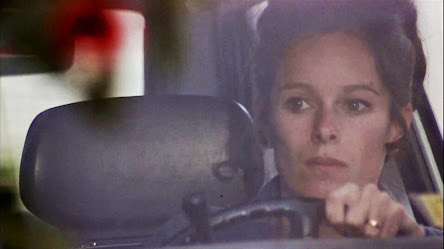
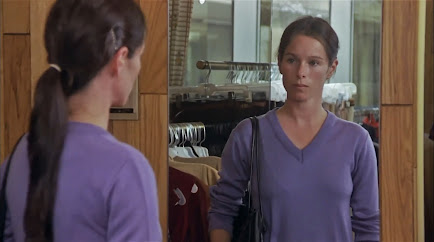

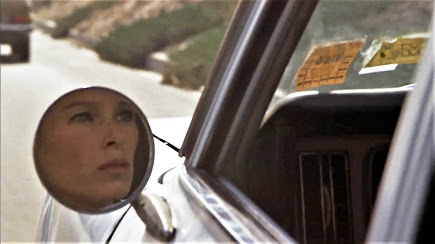
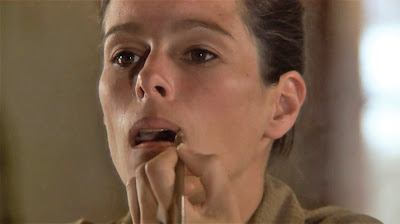



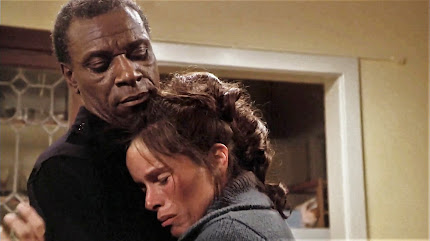





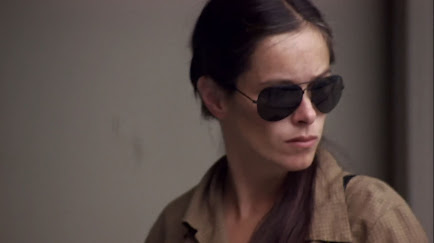







.JPG)















